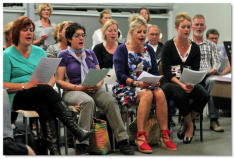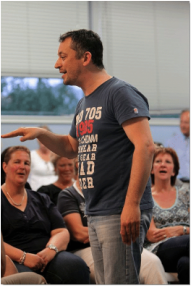increase your individual responsability in group singing

A personal attitude in choral singing is much more then a vocal technical matter. In my experience, many choir singers, or even people in a vocal ensemble, are too dependent on their neighbours, who are more confident at their part. But when that person is no longer there, the confrontation with difficult parts arise and may not be as pleasurable or as successful.
Too bad, singing can be much more joyful if only we knew exactly what to do. So how about their contribution to the progressing value of the sound and the energy of the choir ?
I have also noticed that a lot of singers have no clue whatsoever what other singers in other parts of the harmony are doing. Sadly enough, the singing is often limited to what they are doing themselves. - An arrangement is not something that is born by coincidence; every part is somehow related to another, and gives meaning to the other parts.
In a playfull way, I want to prove that an individual responsible singer contributes to the magic of the arrangement. (and to relieve a conductor of wasted sweat ;) )
I prefer to put singers (with polyphonic experience) in a position to feel and find their place in the harmony, without the use of any written paper..
Too bad, singing can be much more joyful if only we knew exactly what to do. So how about their contribution to the progressing value of the sound and the energy of the choir ?
I have also noticed that a lot of singers have no clue whatsoever what other singers in other parts of the harmony are doing. Sadly enough, the singing is often limited to what they are doing themselves. - An arrangement is not something that is born by coincidence; every part is somehow related to another, and gives meaning to the other parts.
In a playfull way, I want to prove that an individual responsible singer contributes to the magic of the arrangement. (and to relieve a conductor of wasted sweat ;) )
I prefer to put singers (with polyphonic experience) in a position to feel and find their place in the harmony, without the use of any written paper..
how do I approach ?

- We listen to and discuss all kind of pop - a capella samples (quite easy listening-arrangements) by :
- learning to selectively listen to what is going on behind the lead vocals. (What is happening, and how many vocal parts do we hear, etc.)
- learning to understand by experiencing how your part gives meaning to the other parts in an arrangement.
- trying to copy what you are hearing and experiment in little groups..
- being playfull with some singing mind-games, but also vocal/body percussion.
- creating some little arrangements on the spot.
If there is a specific question from the choir/conductor, I might be able to help on interpretation / vocal technique / phrasing/ colour / blending / group dynamics.. etc..
The whole workshop is built on the JOY of failing and succeeding, but most of all on getting you out of your comfort zone, and reach out to your own 'magical vocal skills' when being part of an arrangement. I intend to enhance the strength of choir singers, and increase their individual joy of singing.
|
I had the honor to work with the Madrigal Singers in the Philippines (Manilla)
|
